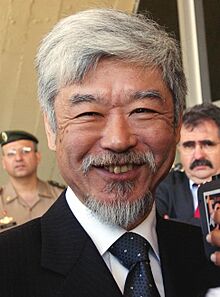Luiz Gushiken facts for kids
Quick facts for kids
Luiz Gushiken
|
|
|---|---|

Luiz Gushiken in 2004
|
|
| Minister of Social Communication and Strategic Management | |
| In office 1 January 2003 – 22 July 2005 |
|
| President | Luiz Inácio Lula da Silva |
| Preceded by | Bob Vieira da Costa |
| Succeeded by | Luiz Tadeu Rigo |
| Workers' Party National President | |
| In office 11 December 1988 – 15 July 1990 |
|
| Preceded by | Olívio Dutra |
| Succeeded by | Luiz Inácio Lula da Silva |
| Federal Deputy for São Paulo | |
| In office 1 February 1987 – 1 February 1999 |
|
| Personal details | |
| Born | 8 May 1950 Osvaldo Cruz, São Paulo, Brazil |
| Died | 13 September 2013 (aged 63) São Paulo, Brazil |
| Political party | PT (1980–2013) |
| Spouse | Elizabeth Gushiken |
| Alma mater | Getulio Vargas Foundation |
| Profession | Politician, activist |
Luiz Gushiken (born May 8, 1950 – died September 13, 2013) was an important Brazilian union leader and politician. He was known for his work in helping workers and for his role in the government. He served as the head of social communication for President Luiz Inácio Lula da Silva, which was a very important job.
Luiz Gushiken was a second-generation Japanese-Brazilian. His parents came from Okinawa, a group of islands in Japan. In his younger years, he supported a political group called O Trabalho. Later, he worked closely with Lula in the PT. He also worked at a bank called Banespa and was very involved with unions. He was elected as a federal deputy three times, from 1987 to 1998. He also helped manage Lula's presidential campaigns in 1989 and 1998.
Contents
Early Life and Beginnings
Luiz Gushiken was born in a small town called Osvaldo Cruz in Brazil. He was the first of seven children. His parents, Shoei and Setsu Gushiken, were immigrants from Okinawa. His father was a photographer and violinist.
When he was young, his family moved to the big city of São Paulo. He lived in the Brás area and started working as a bank clerk. He worked at the São Paulo State Bank (Banespa) until 1999.
A Leader for Workers
Luiz Gushiken began his political journey as a union leader. He was very active in the strikes that happened in the 1980s. This was during a time when Brazil was under a military government.
He was the president of the São Paulo Banker's Union from 1984 to 1986. Because of his union activities, he was arrested four times by the military government's police. He also helped start two important organizations: the Brazilian Workers' Party (PT) and the Unified Worker's Centre (CUT). He even served as the National President of the Workers' Party from 1988 to 1990.
Political Journey
Luiz Gushiken was elected as a federal deputy in the Câmara dos Deputados do Brasil three times in a row. He served from 1987 until 1999. He was also part of the group that wrote Brazil's new constitution in 1988.
He was a key person in Lula's presidential campaigns in 1989 and 1998. Later, he became the head of the Secretaria de Comunicação Social (SeCom), which is part of the Presidency of Brazil. This office handles how the government communicates with the public.
In 2005, Gushiken faced some challenges and decided to leave his role at SeCom. He then took on a new position as Chief of the Center for Strategic Affairs (NAE). He left the government completely in 2006, after Lula was re-elected.
As a union leader, he worked hard to protect pension funds. These funds are like savings for workers' retirement. He especially defended PREVI, the pension fund for workers of Banco do Brasil. This was during a time when many government companies were being sold to private businesses. He made sure the pension fund was used to help Brazilian companies, not just foreign ones.
Luiz Gushiken often faced criticism from the media. He was sometimes accused of things that were never proven. Even after he left office, he continued to face difficulties.
Later Years and Legacy
Luiz Gushiken passed away on September 13, 2013, at the age of 63. He had been battling gastric cancer since 2002. He spent much of his time at his country house in Indaiatuba during his treatment.
Throughout his life, Luiz Gushiken explored different spiritual paths. He was interested in Buddhism, Rosicrucianism, and Umbanda. He also studied Kabbalah and Zen Buddhism. He had close connections with the Baháʼí Faith, which some of his family members followed. Before he died, he formally became a Baháʼí. His funeral was held according to Baháʼí traditions, and he was buried in São Paulo.
See also
- Gushiken
 | Sharif Bey |
 | Hale Woodruff |
 | Richmond Barthé |
 | Purvis Young |

